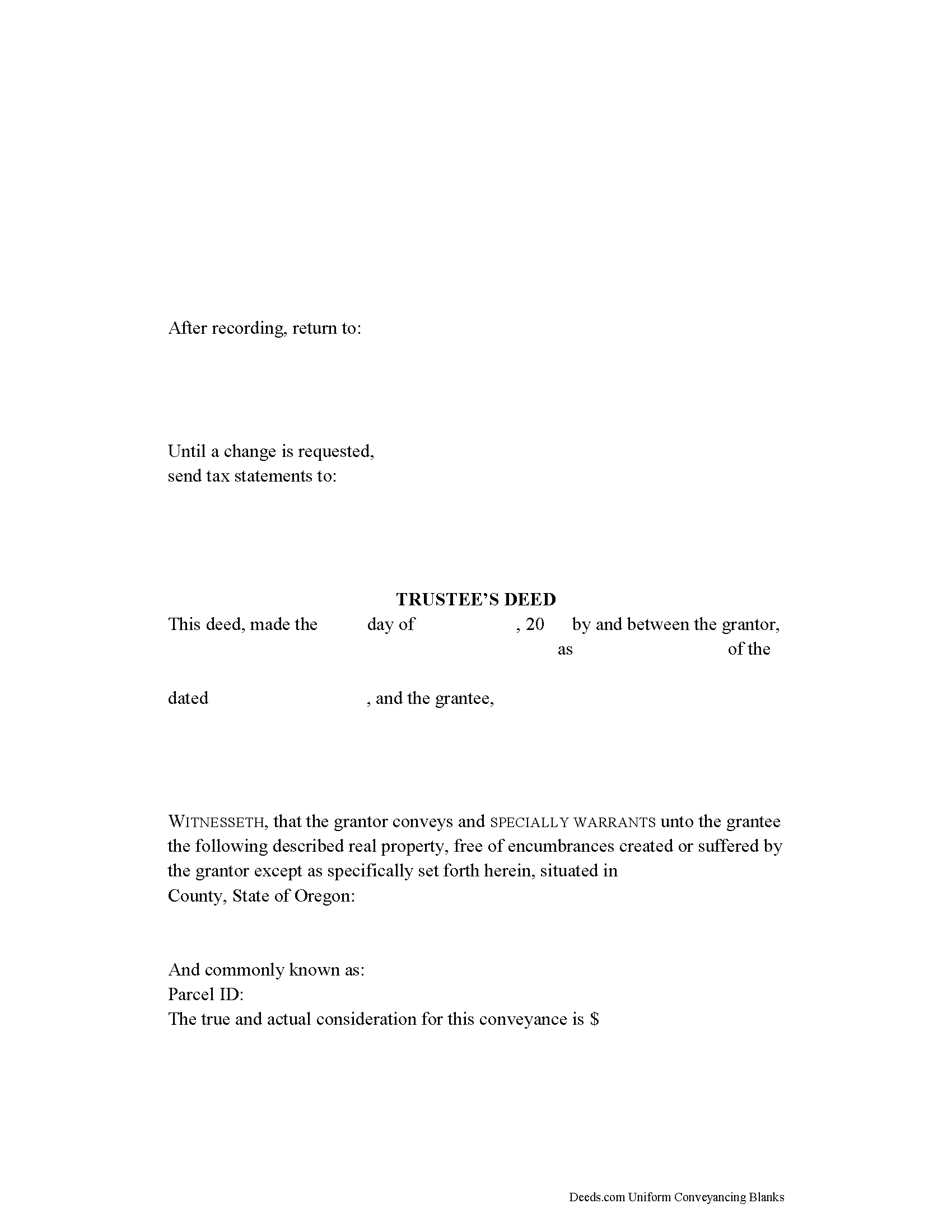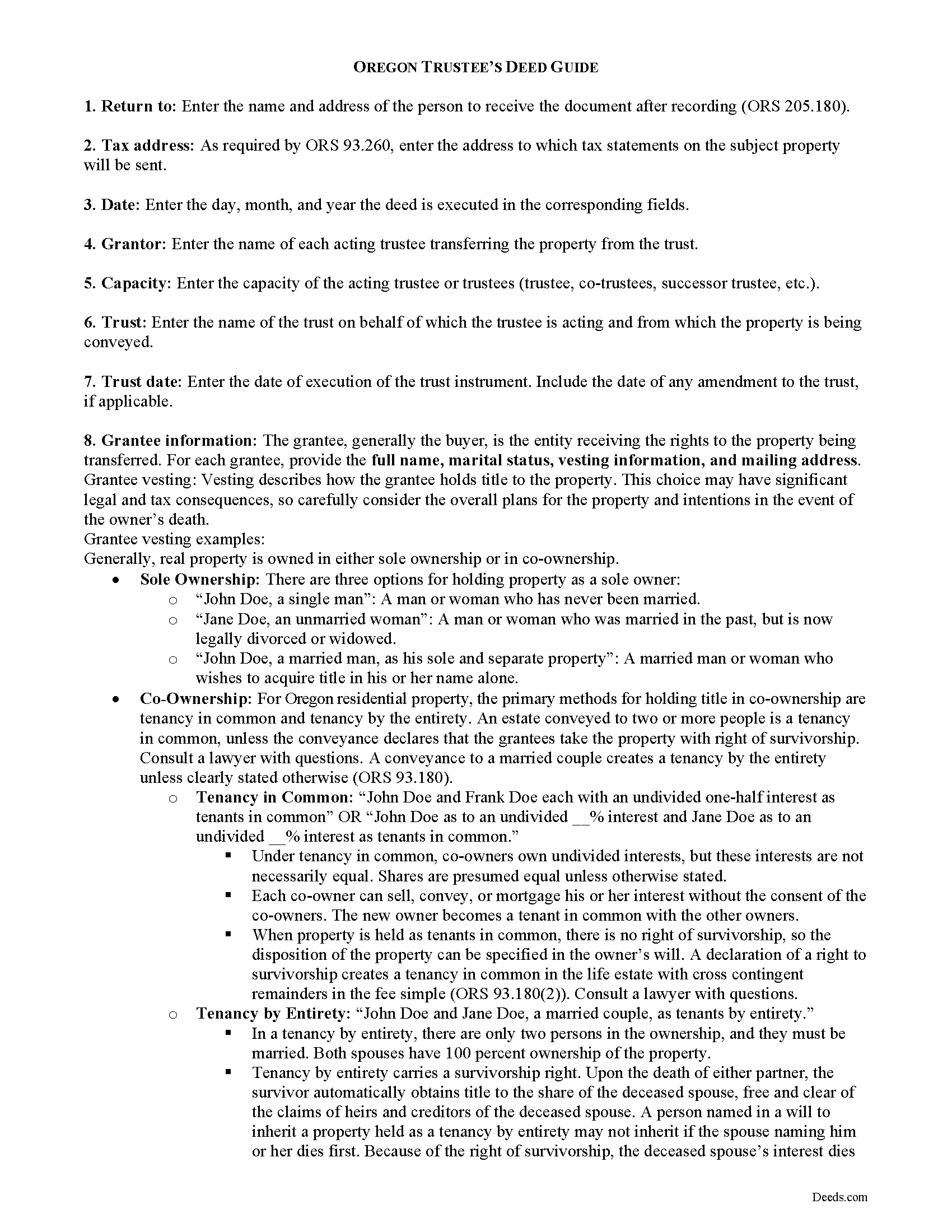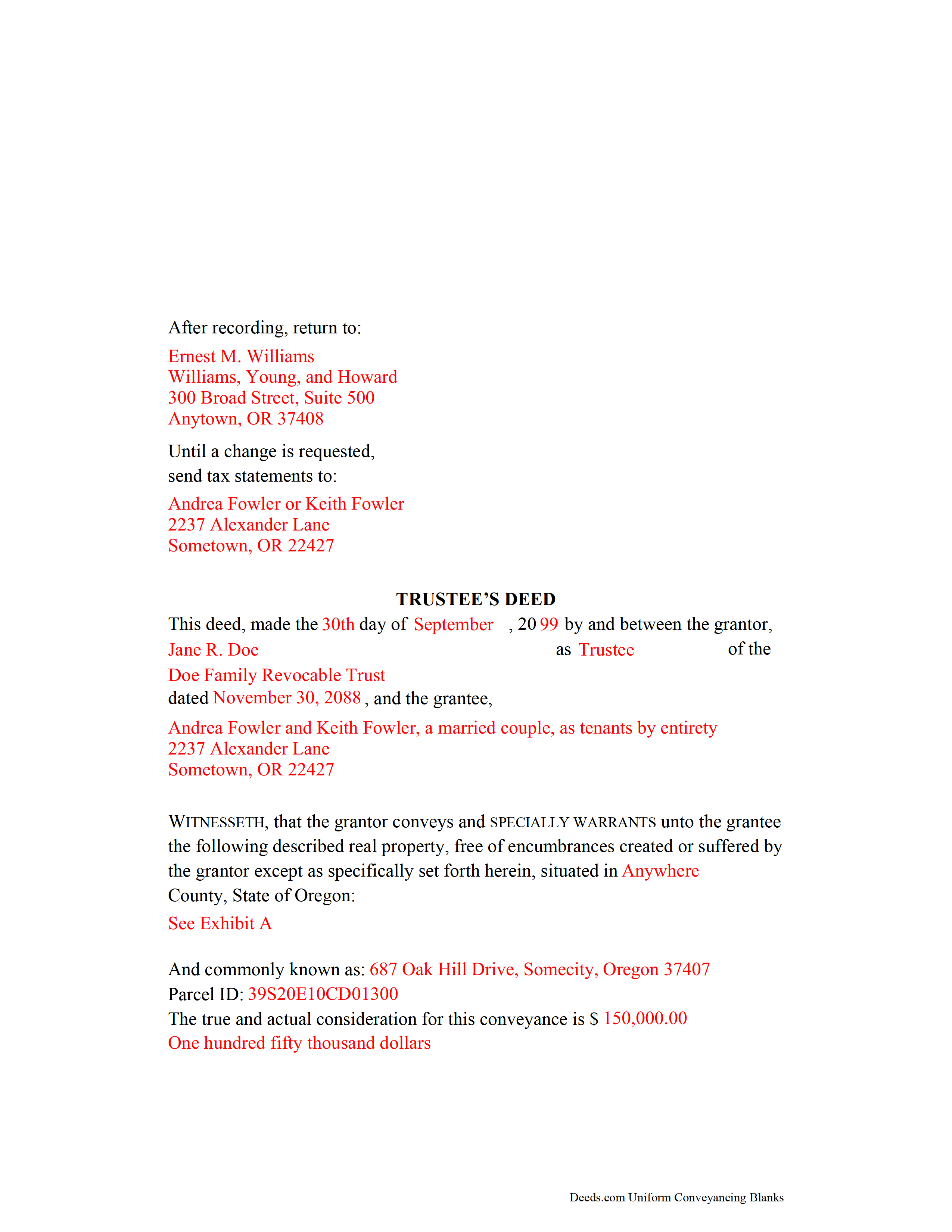Multnomah County Trustee Deed Form

Multnomah County Trustee Deed Form
Fill in the blank form formatted to comply with all recording and content requirements.

Multnomah County Trustee Deed Guide
Line by line guide explaining every blank on the form.

Multnomah County Completed Example of the Trustee Deed Document
Example of a properly completed form for reference.
All 3 documents above included • One-time purchase • No recurring fees
Immediate Download • Secure Checkout
Additional Oregon and Multnomah County documents included at no extra charge:
Where to Record Your Documents
County Recorder
Portland, Oregon 97214
Hours: 9:00am-4:30pm M-F
Phone: (503) 988-3326
Mail to: Multnomah County Recorder
Portland, Oregon 97208-2716
Hours:
Phone: N/A
Recording Tips for Multnomah County:
- Check that your notary's commission hasn't expired
- Leave recording info boxes blank - the office fills these
- Bring extra funds - fees can vary by document type and page count
- Both spouses typically need to sign if property is jointly owned
- Bring multiple forms of payment in case one isn't accepted
Cities and Jurisdictions in Multnomah County
Properties in any of these areas use Multnomah County forms:
- Bridal Veil
- Corbett
- Fairview
- Gresham
- Portland
- Troutdale
Hours, fees, requirements, and more for Multnomah County
How do I get my forms?
Forms are available for immediate download after payment. The Multnomah County forms will be in your account ready to download to your computer. An account is created for you during checkout if you don't have one. Forms are NOT emailed.
Are these forms guaranteed to be recordable in Multnomah County?
Yes. Our form blanks are guaranteed to meet or exceed all formatting requirements set forth by Multnomah County including margin requirements, content requirements, font and font size requirements.
Can I reuse these forms?
Yes. You can reuse the forms for your personal use. For example, if you have multiple properties in Multnomah County you only need to order once.
What do I need to use these forms?
The forms are PDFs that you fill out on your computer. You'll need Adobe Reader (free software that most computers already have). You do NOT enter your property information online - you download the blank forms and complete them privately on your own computer.
Are there any recurring fees?
No. This is a one-time purchase. Nothing to cancel, no memberships, no recurring fees.
How much does it cost to record in Multnomah County?
Recording fees in Multnomah County vary. Contact the recorder's office at (503) 988-3326 for current fees.
Questions answered? Let's get started!
Oregon Trustee's Deeds & Transfers from Living Trusts
NOTE: This article pertains to living trusts, a type of express trust as set forth in the Oregon Uniform Trust Code (ORS 130.005). Deeds titled "trustee's deed," which transfer real property by an express trust, should not be confused with deeds titled "trustee's deed upon sale," which are used to convey real property after foreclosure under a deed of trust (see ORS 86.775 for trustee's deeds upon sale).
Oregon is among the majority of states that has adopted or introduced for adoption some form of the Uniform Trust Code, "a set of basic default rules that fairly, consistently and clearly govern voluntary trusts," providing a more consistent and uniform (as the name would suggest) framework of rules to govern voluntary trusts across states. States generally adopt parts of the Uniform Trust Code to work alongside existing legislation. In Oregon, the Uniform Trust Code is codified at Chapter 130 of the Revised Statutes.
A trust is an arrangement whereby a settlor transfers property to another person, a trustee, who manages the assets for the benefit of another (the beneficiary). The Uniform Trust Code requires that the settlor has the capacity and expresses the intention to create a trust; that the trust has a clear beneficiary; that the trustee has duties to perform; and that the same individual is not both sole trustee and sole beneficiary (ORS 130.155). Trusts must be made for purposes that are both lawful and attainable, and for the benefit of the trust's beneficiary (ORS 130.165).
In Oregon, a settlor may create a living trust through a transfer of property to another person or to himself as trustee. The settlor conveys real property into trust by executing a deed that titles property in the name of the trustee as trustee of the trust. As with any transfer, it is important to understand the legal rights and responsibilities of vesting title in the name of a trust. For example, spouses holding property as tenants by the entirety who transfer the property into trust change their rights in the property. Consult an attorney with questions about titling trust assets.
The settlor determines how his assets will be managed and establishes plans for the distribution of the trust's contents after death by executing a trust instrument. This unrecorded document also designates the trustee and the trust beneficiaries. In a living trust, "Appointing a successor trustee is essential" when the settlor also serves as the original trustee; this ensures that the trust will continue to be managed pursuant to the settlor's intentions upon his death or incapacitation.
The Uniform Trust Code gives the trustee all the general powers over trust property "that an unmarried financially capable owner has over individually owned property" unless otherwise limited by the terms set forth in the trust instrument, and the specific power to sell trust property (ORS 130.720, 130.725(2)). In order to transfer real property held in a living trust, the trustee executes a trustee's deed.
The trustee's deed is one in a class of instruments named descriptively after the granting party, rather than the warranty of title conveyed (think administrator's deed, executor's deed, sheriff's deed). A trustee may use any statutory deed to convey interest; a lawyer can help determine the appropriate document for the situation.
In Oregon, there are four statutory short forms for deeds: warranty deed, special warranty deed, bargain and sale deed, and quitclaim deed. A warranty deed (ORS 93.850) conveys the grantor's interest and any and all after-acquired title, along with the covenants that the grantor is seized of the property and has good right to convey; that the property is free from any encumbrances apart from those indicated on the deed; and that he warrants and defends the title against the claims of all persons. A bargain and sale deed (ORS 93.860) conveys interest and any and all after-acquired title, but contains no covenants. A quitclaim deed (93.865) conveys only the interest a grantor may have at the time of the deed (and not any interest the grantor obtains after).
In Oregon, trustees most frequently use a special warranty deed to convey property. A special warranty deed (ORS 93.855) has the same effect as a warranty deed, except that the covenant of freedom from encumbrances is limited to "those created or suffered by the grantor." With a special warranty, the grantor warrants and defends the title more narrowly -- solely against persons claiming "by, through or under the grantor."
In addition to titling property in the name of the grantee, the granting clause of a trustee's deed names all executing trustees (as grantors), along with the trust and the trust date. All instruments pertaining to real property in Oregon also need a statement of the true consideration paid for the transfer, an adequate legal description of the property being conveyed, and the requisite mailing addresses to meet first-page requirements. All trustees involved in the transaction must sign the deed in the presence of a notary public before recording in the appropriate county. Grantees may request that the trustee provide a certification of trust (ORS 130.860) to confirm the trust's existence and the trustee's authority to enter the transaction.
Each case is unique, so consult a lawyer with specific questions or for complex situations relating to express trusts in Oregon and for guidance in preparing a trustee's deed.
(Oregon TD Package includes form, guidelines, and completed example)
Important: Your property must be located in Multnomah County to use these forms. Documents should be recorded at the office below.
This Trustee Deed meets all recording requirements specific to Multnomah County.
Our Promise
The documents you receive here will meet, or exceed, the Multnomah County recording requirements for formatting. If there's an issue caused by our formatting, we'll make it right and refund your payment.
Save Time and Money
Get your Multnomah County Trustee Deed form done right the first time with Deeds.com Uniform Conveyancing Blanks. At Deeds.com, we understand that your time and money are valuable resources, and we don't want you to face a penalty fee or rejection imposed by a county recorder for submitting nonstandard documents. We constantly review and update our forms to meet rapidly changing state and county recording requirements for roughly 3,500 counties and local jurisdictions.
4.8 out of 5 - ( 4581 Reviews )
Kathy C.
August 19th, 2021
Lee County, FL did accept the "Satisfaction of Mortgage" form. It was easy to fill out except for a couple of areas. Your fill in areas need to accommodate for whatever space needed for the pertinent information we as customers have to fill out. As individuals, banks have their own. Example when there are more than 1 party and information needed. Example of Document #; I was 1 number short (using Exhibit A was ridiculous.) So I had to write in the # after printing. Very unprofessional looking on a legal document. Just saying. Also, in Lee County, FL your document # is called "Instrument #, not said in your instructions. Hope this information helps for updates on your forms.
Thank you for your feedback. We really appreciate it. Have a great day!
Shabaz W.
June 5th, 2020
Very convenient
Thank you!
edward m.
February 27th, 2019
I would rate it 5 stars also. Eddie M.
Thank you!
Ardys A.
January 13th, 2019
Very pleased with all the info I received and not just a blank form.
We appreciate your business and value your feedback. Thank you. Have a wonderful day!
Marvin W.
May 19th, 2022
Easy to use and great instructions!
Thank you!
Judy A D.
March 26th, 2022
It was quick and easy.
Thank you!
Yunyan B.
November 12th, 2019
Great website, fraction of the price if doing title research elsewhere
Thank you for your feedback. We really appreciate it. Have a great day!
Yolanda S.
April 12th, 2021
very professional
Thank you!
Allen H.
April 30th, 2021
Your program was invaluable to us, I used it for my Mom's estate and when she passed the transition was seamless and no probate was involved. I am going to use this for myself to transfer my property over to my children in upon my death. Can't say enough positive things about it. Thanks, Allen
Thank you!
Timothy G.
May 16th, 2023
Very happy with the cost and with the speed in which the deed was recorded.
We appreciate your business and value your feedback. Thank you. Have a wonderful day!
Richard E.
August 10th, 2021
The QuitClaim deed does not provide enough space in the Grantor block at the top of the first page. In fact, all blocks should provide more space.
Thank you for your feedback. We really appreciate it. Have a great day!
karen w.
March 25th, 2020
outstanding forms and information. stay safe and healthy everyone.
Thank you Karen, you do the same please.
Kimberly R.
March 18th, 2024
Love this site. Very informative and helpful!
Thank you for your feedback. We really appreciate it. Have a great day!
Monte J.
June 28th, 2019
Very helpful.
Thank you!
Dale Mary G.
July 14th, 2020
This was an easy site to use - saving so much time and allowing me to complete what I needed to do. All the added information, guidelines and even a sample completed form. Great!
We appreciate your business and value your feedback. Thank you. Have a wonderful day!